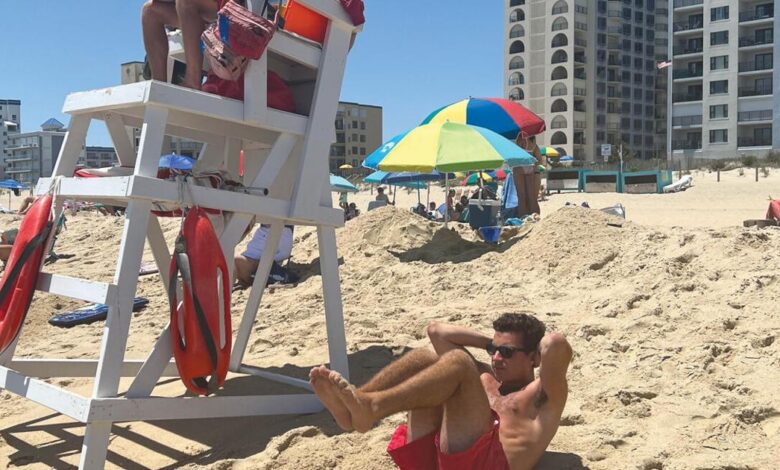Physical fitness main key to lifeguarding in Ocean City | On Guard

(June 23, 2023) Have you ever been on the beach when the lifeguard is dragging their stand around? It is quite the sight to behold if you are the average beach patron.
They drag it to the shoreline in the morning and back to the dunes in the evening and sometimes during the day, depending on the tide.
The lifeguard stands weigh 300 pounds and part of the guard’s daily routine is dragging across the beach. It is so critical; it is one of the eight components of our Pre-employment Physical Skills Evaluation, in addition to running and swimming skills.
They also carry their big red bag loaded with the day’s necessities to sustain themselves and to perform the job in all kinds of weather. No one knows how much the bags weigh; it depends on the day and the individual lifeguard and their particular needs.
You may have noticed the surf rescue technicians, or SRTs, remain on duty regardless of the weather. The next time you see a lifeguard coming or going to work, take note of all the things the guards do to set up their “office” each day. It takes a certain level of fitness to just set up and close each day. (Note: All too often an SRT comes to work only to find their “office”, or stand, damaged or missing. If you see anyone attempting to damage or throw a stand in the ocean, please call 911.)
At full staffing, the Ocean City Beach Patrol employs over 200 people. Surf rescue technician is the title that our lifeguards earn once they complete Surf Rescue Academy, and you see them wearing their red uniforms and manning the tall and very heavy white lifeguard stand.
Each SRT is a member of one of the 18 crews that stretch from the Inlet jetty to the Delaware state line. Each crew functions as a team and has five or six lifeguard stands, with the crew chief stand in the center, along with a two-way radio as a communications link to the town’s 911 communications center.
In addition to the crew chief there is an assistant crew chief and up to six more SRTs who work together to cover all stands in the crew from 10 a.m. to 5:30 p.m. as well as days off, lunch breaks and mandatory workouts.
Yes, mandatory workouts during their workday. They not only have to meet certain physical requirements to be hired as SRTs, and be re-qualified each summer season with the patrol, but they also must complete a prescribed daily workout of at least 20 minutes per day during their guarding shifts.
Our SRTs are no different than a professional athlete who we have hired for their physical attributes, and trained in techniques that allow them to use special skills and abilities to protect you when you visit.
To provide coverage for workouts, each SRT is schedules for one, 4.5-hour shift each week but not assigned to a specific stand on that day. When working the shift, the SRT alerts their workday at 10 a.m. They begin by making sure the entire area of the beach covered by their crew is prepared for the day.
Once set up and administrative tasks are completed, they begin relieving each SRT on the crew who are on 7.5-hour shifts. Once each SRT is relieved they are required to perform an ordinance check (local rules and laws) on their beach by walking (jogging) among the beach patrons, checking for unsafe conditions and infractions, followed by a mandatory workout prescribed by the crew chief.
The workouts usually consist of swimming, running or both. They can change daily at the discretion of the crew chief that runs them in a certain area. If it’s extremely hot, then it’ll likely be water workout day. But on a day that the wind is high, and temperature moderate, there are all types of various workout activities the crew chief will devise.
Once all crew members have completed their morning duties and workouts the “lunch rover” (the SRT on the 4.5-hour shift) will replace each SRT who is working the full day for a 30-minute lunch break beginning at noon.
Being in top physical condition is not only critical to do the dual job of guarding, but it also helps prevent sport-type injuries, and comes in handy for competitions. Some patrol members compete in contests that are held around the area, and in other parts of the country, for lifeguards.
Each year we send a team of OCBP female guards to women’s competitions. We also send a competition team consisting of males and females to participate in the United States Lifeguard Association Regional competition.
We also participate in the lifeguard olympics, which is usually held in Rehoboth Beach every year. Teams are selected through tryouts that take place before or after work on the SRTs’ personal time, to represent the OCBP. All those who compete are scheduled off and receive no compensation or monetary support from the Town of Ocean City, although many of our teams receive support from local businesses.
All these competitions offer an opportunity for lifeguards throughout the region to display their physical fitness. The top athletes of the Ocean City Beach Patrol will also represent Ocean City at the national and international levels and are all respected throughout the lifesaving community. During the 2022 United State Lifesaving Association’s national competition in California, our own Haley Wright became the gold medalist in the women’s 2K run.
So, when you see guards doing strange maneuvers on the beach, now you know they are probably either doing a mandatory workout devised by their crew chief or training for an upcoming competition … or both!
But rest assured, even though they are on a break and working out, another guard is covering for them so that all 10 miles of Ocean City are fully guarded. However, during their workout they must remain in the area that is covered by their crew so in an emergency they are available to assist and add extra support to the crew.
If you would like to become a lifeguard, it might interest you to know that because of the unique demands of the job, the Ocean City Beach Patrol does not require or recognize certification or experience with other agencies. Anyone seeking employment with the OCBP must successfully complete all aspects of an eight-phase, pre-employment physical skills evaluation.
Testing for OCBP to work next summer (2024) will be offered this summer in Ocean City, beginning on Wednesday, Aug. 9, and in off-site locations this winter. Once a candidate passes the physical skills test, they are appointed to a 65-hour, paid $18.44/hr (2023 pay rate) Surf Rescue Academy.
Prior to the start of academy and each year they return to the patrol, they must pass a mandatory drug test. During Surf Rescue Academy each rookie is trained and assessed in all necessary skills, techniques, procedures and protocols of the Beach Patrol.
Now it is your turn to help us spread the word. If the lifeguards are not on duty, then it is not safe to swim. Always remember to keep your feet in the sand until the lifeguard is in the stand.
As added protection for you and your family always locate the nearest stand with a guard and swim on that beach. Heeding this simple warning could save a life, yours! We stay physically fit to protect you, but we can only do that if you swim while we are on duty.


